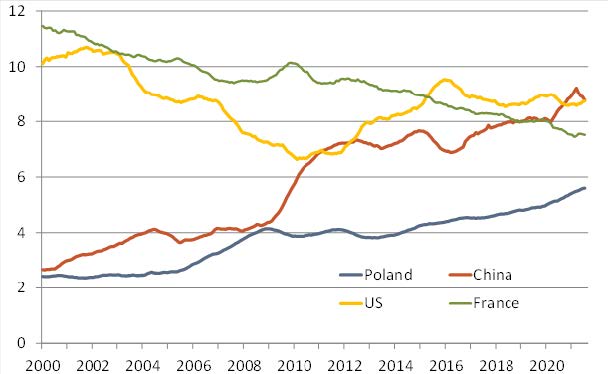China matters. It remains a key engine of global growth.
But Germany and Europe are not weak either, despite the corona-related setback. Ultimately, China needs Europe even more than vice versa.
Vis-à-vis China, Germany is strong enough to act in accordance with its values. It does not need to overlook serious Chinese transgressions to safeguard economic interests.
By working closely with the European Union and the Biden administration, Germany can leverage its influence and reduce its vulnerability to Chinese threats.
Autor
Holger Schmieding
Chief Economist at Berenberg
Kontakt:
DATE
February 2022

Download FULL PDF
1.27 MB pdf
While Germany, just as the other European economies, has had to contend with the fallout from the pandemic, China initially rebounded strongly from spring 2020 onward. Chinese demand for German exports thus became an important support for the recovery in export-oriented Germany.
Chart 1: Share in German goods exports, in %

12-month rolling averages. Source: Destatis
How much room of maneuver does Germany have?
At first glance, this may suggest that Germany should not even try to stand up to an economically powerful and ever more assertive China. Doing so could even be seen as economically self-defeating for Europe’s economic powerhouse. Even though U.S.- German relations have started to improve under the President Biden, the disruptive experience with the Trump administration shows that the European Union in general and Germany in particular need to work more closely with China as the United States is longer the fully reliable partner it used to be.
However, these narrow and short-sighted economic arguments do not stand up to scrutiny.
Are principles just “nice-to-haves”?
As a general matter, attempts to strengthen mutually beneficial economic ties are most welcome. But when it comes to relations with dictatorships such as China and Russia, this raises a fundamental question: To which extent can – or should – German policymakers and the country as a whole afford to uphold values such as human rights, freedom, democracy and respect for international treaties in their dealings with China and Russia?
A closer look at the evidence suggests that the economic restraints on Germany’s room of maneuver in international relations are less binding than is often assumed. Due to its inherent economic strength and its firm anchoring in the European Union, Germany is in a position to act in accordance with its values. It does not need to overlook serious Chinese misbehavior to safeguard its economic interests.
This does not mean that Germany and the EU should use trade sanctions as the instrument of choice in order to make it more costly for China to flout global rules. Depending on the nature and severity of the issue at hand, other instruments such as personal financial and travel sanctions against Chinese officials and business leaders involved may be at least as suitable.
The key point is that Germany need not shy away from taking a clear and principled line because of the potential commercial repercussions if China were to react to such pressure by reducing access to its own market. Resisting an erosion of global rules of trade and behavior – ideally within the framework of the EU and jointly with the United States – is in Germany‘s own long-term interest.
Read the full report.

